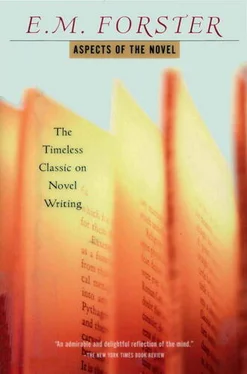The novels we have now to consider all tell a story, contain characters, and have plots or bits of plots, so we could apply to them the apparatus suited for Fielding or Arnold Bennett. But when I say two of their names— Tristram Shandy and Moby Dick —it is clear that we must stop and think a moment. The bird and the shadow are too far apart. A new formula must be found: the mere fact that one can mention Tristram and Moby in a single sentence shows it. What an impossible pair! As far apart as the poles. Yes. And like the poles they have one thing in common, which the lands round the equator do not share: an axis. What is essential in Sterne and Melville belongs to this new aspect of fiction: the fantastic-prophetical axis. George Meredith touched it: he was somewhat fantastic. So did Charlotte Brontë: she was a prophetess occasionally. But in neither of these was it essential. Deprive them of it, and a book remains which still resembles Harry Richmond or Shirley. Deprive Sterne or Melville of it, deprive Peacock or Max Beerbohm or Virginia Woolf or Walter de la Mare or William Beckford or James Joyce or D. H. Lawrence or Swift, and nothing is left at all.
Our easiest approach to a definition of any aspect of fiction is always by considering the sort of demand it makes on the reader. Curiosity for the story, human feelings and a sense of value for the characters, intelligence and memory for the plot. What does fantasy ask of us? It asks us to pay something extra. It compels us to an adjustment that is different to an adjustment required by a work of art, to an additional adjustment. The other novelists say "Here is something that might occur in your lives/' the fantasist says "Here's something that could not occur. I must ask you first to accept my book as a whole, and secondly to accept certain things in my book." Many readers can grant the first request, but refuse the second. "One knows a book isn't real," they say, "still one does expect it to be natural, and this angel or midget or ghost or silly delay about the child's birth—no, it is too much." They either retract their original concession and stop reading, or if they do go on it is with complete coldness, and they watch the gambols of the author without realizing how much they may mean to him.
No doubt the above approach is not critically sound. We all know that a work of art is an entity, etc., etc.; it has its own laws which are not those of daily life, anything that suits it is true, so why should any question arise about the angel, etc., except whether it is suitable to its book? Why place an angel on a different basis from a stockbroker? Once in the realm of the fictitious, what difference is there between an apparition and a mortgage? I see the soundness of this argument, but my heart refuses to assent. The general tone of novels is so literal that when the fantastic is introduced it produces a special effect: some readers are thrilled, others choked off: it demands an additional adjustment because of the oddness of its method or subject matter—like a sideshow in an exhibition where you have to pay sixpence as well as the original entrance fee. Some readers pay with delight, it is only for the sideshows that they entered the exhibition, and it is only to them I can now speak. Others refuse with indignation, and these have our sincere regards, for to dislike the fantastic in literature is not to dislike literature. It does not even imply poverty of imagination, only a disinclination to meet certain demands that are made on it. Mr. Asquith (if gossip is correct) could not meet the demands made on him by Lady into Fox. He should not have objected, he said, if the fox had become a lady again, but as it was he was left with an uncomfortable dissatisfied feeling. This feeling reflects no discredit either upon an eminent politician or a charming book. It merely means that Mr. Asquith, though a genuine lover of literature, could not pay the additional sixpence—or rather he was willing to pay it but hoped to get it back again at the end.
So fantasy asks us to pay something extra.
Let us now distinguish between fantasy and prophecy.
They are alike in having gods, and unlike in the gods they have. There is in both the sense of mythology which differentiates them from other aspects of our subject. An invocation is again possible, therefore on behalf of fantasy let us now invoke all beings who inhabit the lower air, the shallow water, and the smaller hills, all Fauns and Dryads and slips of the memory, all verbal coincidences, Pans and puns, all that is medieval this side of the grave. When we come to prophecy, we shall utter no invocation, but it will have been to whatever transcends our abilities, even when it is human passion that transcends them, to the deities of India, Greece, Scandinavia and Judaea, to all that is medieval beyond the grave and to Lucifer son of the morning. By their mythologies we shall distinguish these two sorts of novels.
A number of rather small gods then should haunt us today—I would call them fairies if the word were not consecrated to imbecility. (Do you believe in fairies? No, not under any circumstances.) The stuff of daily life will be tugged and strained in various directions, the earth will be given little tilts mischievous or pensive, spotlights will fall on objects that have no reason to anticipate or welcome them, and tragedy herself, though not excluded, will have a fortuitous air as if a word would disarm her. The power of fantasy penetrates into every corner of the universe, but not into the forces that govern it—the stars that are the brain of heaven, the army of unalterable law, remain untouched—and novels of this type have an improvised air, which is the secret of their force and charm. They may contain solid character-drawing, penetrating and bitter criticism of conduct and civilization; yet our simile of the beam of light must remain, and if one god must be invoked spedaily, let us call upon Hermes—messenger, thief, and conductor of souls to a not-too-terrible hereafter.
You will expect me now to say that a fantastic book asks us to accept the supernatural. I will say it, but reluctantly, because any statement as to their subject matter brings these novels into the claws of critical apparatus, from which it is important that they should be saved. It is truer of them than of most books that we can only know what is in them by reading them, and their appeal is specially personal —they are sideshows inside the main show. So I would rather hedge as much as possible, and say that they ask us to accept either the supernatural or its absence.
A reference to the greatest of them— Tristram Shandy —will make this point clear. The supernatural is absent from the Shandy ménage, yet a thousand incidents suggest that it is not far off. It would not be really odd, would it, if the furniture in Mr. Shandy's bedroom, where he retired in despair after hearing the omitted details of his son's birth, should come alive like Belinda's toilette in The Rape of the Lock, or that Uncle Toby's drawbridge should lead into Lilliput? There is a charmed stagnation about the whole epic—the more the characters do the less gets done, the less they have to say the more they talk, the harder they think the softer they get, facts have an unholy tendency to unwind and trip up the past instead of begetting the future, as in well-conducted books, and the obstinacy of inanimate objects, like Dr. Slop's bag, is most suspicious. Obviously a god is hidden in Tristram Shandy, his name is Muddle, and some readers cannot accept him. Muddle is almost incarnate—quite to reveal his awful features was not Sterne's intention; that is the deity that lurks behind his masterpiece—the army of unutterable muddle, the universe as a hot chestnut. Small wonder that another divine muddler, Dr. Johnson, writing in 1776, should remark, "Nothing odd will do long: Tristram Shandy did not last!" Doctor Johnson was not always happy in his literary judgments, but the appropriateness of this one passes belief.
Читать дальше












